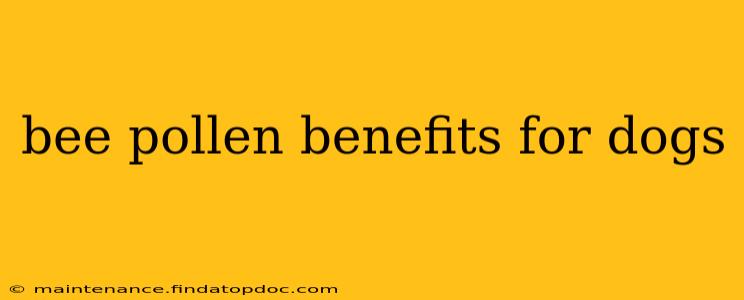Bee pollen, a nutritional powerhouse for humans, has also sparked interest among pet owners curious about its potential benefits for their canine companions. While research specifically on bee pollen and canine health is limited, anecdotal evidence and its rich nutrient profile suggest potential advantages. This article delves into the purported benefits of bee pollen for dogs, addressing common questions and highlighting important considerations.
What is Bee Pollen?
Bee pollen is a complex mixture of pollen grains collected by bees, combined with nectar, bee saliva, and other secretions. This tiny, naturally occurring granule is a complete protein source, boasting a wide array of vitamins, minerals, amino acids, and antioxidants. Its nutritional density makes it a tempting supplement for enhancing canine health.
Potential Benefits of Bee Pollen for Dogs
Many pet owners believe bee pollen offers several benefits for their dogs, including:
-
Enhanced Energy Levels: The vitamins and minerals in bee pollen could potentially boost energy and vitality, especially in older or less active dogs.
-
Improved Immune System Function: Its rich antioxidant content may contribute to a stronger immune system, helping dogs fight off infections and illnesses. The presence of various vitamins and minerals supports immune cell activity.
-
Improved Digestive Health: Some pet owners report improved digestion and reduced symptoms of gastrointestinal upset in their dogs after incorporating bee pollen into their diet. The presence of probiotics and enzymes may play a role here.
-
Shiny Coat and Healthy Skin: The nutrients in bee pollen, such as essential fatty acids and vitamins, might promote a healthy coat and skin, resulting in a shinier, healthier-looking dog.
-
Increased Appetite: For dogs with a low appetite, bee pollen might act as a natural appetite stimulant.
What are the potential side effects of Bee Pollen for Dogs?
While generally considered safe, bee pollen can cause allergic reactions in some dogs. Symptoms might include:
- Itching or hives
- Swelling
- Vomiting
- Diarrhea
- Difficulty breathing
If you notice any of these symptoms, discontinue use immediately and consult your veterinarian.
How Much Bee Pollen Should I Give My Dog?
There's no universally recommended dosage for bee pollen in dogs. It's crucial to start with a very small amount, such as a pinch, and gradually increase the quantity while closely monitoring your dog's reaction. Always consult your veterinarian before introducing any new supplements to your dog's diet, including bee pollen. They can help you determine an appropriate dosage based on your dog's size, breed, and health status.
Is Bee Pollen Safe for All Dogs?
While generally safe for many dogs, bee pollen isn't suitable for all canines. Pregnant or nursing dogs, those with known allergies, or dogs with underlying health conditions should avoid bee pollen without explicit veterinary guidance. Dogs with kidney disease or liver problems may need to avoid bee pollen due to its potentially high concentration of nutrients.
Can I Give My Dog Raw Bee Pollen?
Raw bee pollen is the most potent form, offering a higher concentration of nutrients. However, it also carries a greater risk of contamination with pesticides, herbicides, or harmful bacteria. It is recommended to purchase bee pollen from a reputable supplier that practices sustainable harvesting techniques.
Where can I buy bee pollen for my dog?
Bee pollen for dogs can be purchased from various pet supply stores, online retailers, and health food stores. Look for products specifically designed for pets and clearly label their ingredients. Always check reviews and ensure the supplier maintains high standards of quality and purity.
Conclusion:
Bee pollen offers a wide array of potential benefits for dogs, stemming from its rich nutritional profile. However, it's essential to proceed with caution, starting with a small amount, monitoring for allergic reactions, and consulting your veterinarian before incorporating bee pollen into your dog's diet. Remember, responsible pet ownership involves making informed decisions, prioritizing your dog's well-being, and seeking professional veterinary advice when needed.
